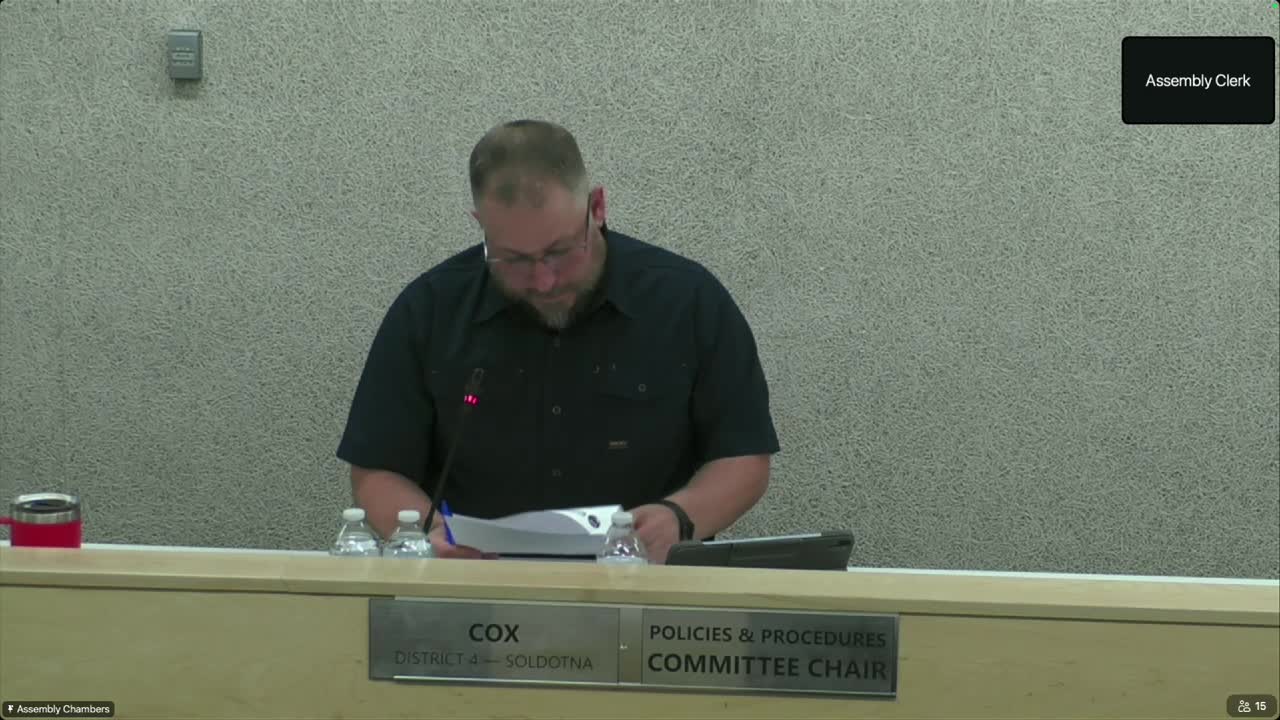Kenai Peninsula Borough adopts rewritten tax chapters after heated debate over senior exemption stacking
Get AI-powered insights, summaries, and transcripts
Subscribe
Summary
The Kenai Peninsula Borough Assembly enacted ordinance 2025‑21 rewriting borough tax code chapters for real and personal property and tax exemptions. Debate centered on whether exemptions could "stack" and a cap on combined exemptions; the assembly amended the draft and approved the ordinance 5‑4.
The Kenai Peninsula Borough Assembly on Oct. 14 enacted ordinance 2025‑21, which repeals and reenacts KPB chapter 5.12 (real property tax), creates a new KPB chapter 5.11 for personal property tax, a new KPB chapter 5.13 for tax exemptions/credits/deferrals and a new chapter 5.15 for tax appeals.
The measure was presented by Assembly Chair Tyson Cox and co‑sponsored by Mayor Peter A. Michicky. Cox described the rewrite as largely organizational: separating real and personal property chapters to make the code more readable and to preserve existing policy. "There's not a lot of changes to this besides putting them into their own ... making it much more readable," Chair Cox said during the committee report.
Why it matters: the ordinance implements long‑running code cleanup but intersected with a recent voter‑approved change that increases the residential real property exemption from $50,000 to $75,000. Assembly members debated whether the new $75,000 exemption should be able to "stack" with other exemptions (notably the senior/disabled veteran exemption) and whether a maximum combined exemption should be set.
Discussion, amendments and outcome
Vice President Lenora Cooper moved to remove language that would have specified a maximum combined exemption for stacked exemptions, arguing the public should have input on stacking and that the rewrite's primary purpose was chapter separation. Multiple amendments followed. Assemblymember Tyson Cox successfully amended the Cooper amendment to substitute language capping combined exemptions at $375,000. After debate and a revote for clarification, the assembly voted 5 yes, 4 no to adopt the Cox amendment (which set the $375,000 cap into the ordinance as adopted). The ordinance as amended was then enacted by unanimous consent when the motion to enact was called.
Members who spoke frequently on the issue included Vice President Lenora Cooper; Chair Tyson Cox; Mayor Peter A. Michicky; Assemblymembers Leslie Morton, Brent Johnson and Tom Tonseth. Remarks captured the range of views: Cooper and others urged a separate, public discussion about stacking and public notice; Cox and some colleagues argued a cap was necessary to avoid shifting tax burden and to respect prior local decisions about senior exemptions.
What the ordinance changes (selected points)
- Separates existing tax code provisions into distinct chapters for real property, personal property, exemptions, and appeals. - Incorporates administrative edits and references to assessment standards. - Adds provisions governing exemptions, including the senior/disabled veteran exemption and procedures for who may claim an exemption for the same parcel. - As amended by the assembly, the ordinance includes a maximum combined exemption figure of $375,000 in the subsection addressing multiple exemptions for a single parcel; the assembly also approved language limiting exemptions to "one per parcel" for senior/disabled veteran exemptions.
Looking ahead
Assembly members said any broader changes to exemption stacking or the dollar cap could be revisited by a future assembly. Several members emphasized the need for a public workshop or longer discussion with fiscal figures before making further changes to exemption policy.
Ending
Ordinance 2025‑21 passed after amendment; the vote on the Cox amendment was recorded as 5 yes, 4 no and the final enactment was approved following regular motion procedures. The ordinance will be reflected in the borough code as revised and will take effect per the dates stated in the ordinance text.
